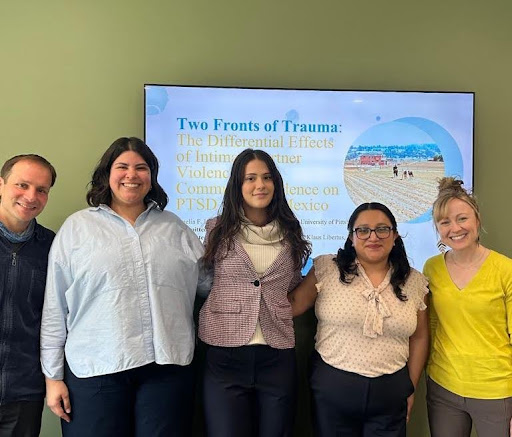From UCSB to the Professoriate: Catching Up with Alumnae Mayra del Carmen and Andrea Medrano
In 2023, we spoke with alumnae Mayra del Carmen (B.A. Psychology and Chicana/o Studies, 2014) and Andrea Medrano (B.S. Psychological & Brain Sciences with a Minor in Applied Psychology, 2017) as they prepared to complete their PhDs at the University of Michigan and begin tenure-track positions at Montana State University and the University of Pittsburgh,  respectively (click here to read the 2023 Inside Psychology Newsletter). Mayra is leading the POWER Lab, and Andrea the CREAR Lab. Two years later, we reconnected to hear how their first chapters as assistant professors are unfolding—their research, teaching, and reflections on the transition from graduate student to faculty life.
respectively (click here to read the 2023 Inside Psychology Newsletter). Mayra is leading the POWER Lab, and Andrea the CREAR Lab. Two years later, we reconnected to hear how their first chapters as assistant professors are unfolding—their research, teaching, and reflections on the transition from graduate student to faculty life.
Inside Psychology (IP): Can you give us a brief overview of your current research projects and what excites you the most about them?
Mayra del Carmen (MdC): Right now, I’m working on validating the Visibility Experiences at Work Scale (VEWS), which captures how people experience both invisibility and hypervisibility in the workplace. My research has found meaningful correlations between these visibility experiences, workplace mistreatment, and poor mental health.
I’m also collaborating with my academic siblings on developing a Classism Experiences Scale. This measure aims to assess how everyday class-based slights impact workers’ well-being, experiences of harassment, and sense of belonging.
What excites me most is building tools that help us, as psychologists, better understand the nuanced realities workers face every day.
Andrea Medrano (AM): My research centers on how violence exposure—particularly gender-based and community violence—shapes mental health across diverse cultural contexts, including Honduras, Puerto Rico, and Mexico. These projects go beyond documenting poly-victimization and trauma by identifying protective factors—like familismo, spirituality, or collective resilience—that are culturally rooted and meaningful to the communities we work with.
What excites me most is partnering directly with local communities to not only document the harms people face and bring much-needed attention to these prevalent yet overlooked issues, but also to amplify local sources of strength, healing, and resistance.
IP: How do you hope your work will impact the field (or broader community) in the long term?
MdC: I hope that the research I’ve conducted with farmworkers in California’s Central Valley will serve as a lasting archive of their experiences—capturing voices and stories that are often overlooked or erased.
AM: I hope my work helps shift the conversation from pathology to possibility, moving away from psychology’s long-standing tradition of deficit-based research toward an approach that amplifies the strengths, resilience, and resistance of historically marginalized communities.
IP: What surprised you the most about stepping into the role of faculty?
MdC: I’ve been pleasantly surprised by how smoothly the transition has gone when it comes to research, teaching, and service—and I’m incredibly grateful to my graduate training and mentors for preparing me well. The most challenging part has been learning to navigate new management systems and institutional structures as a faculty member.
AM: I knew I would love the freedom to pursue meaningful research and the opportunity to mentor students, but I was surprised by how much joy I get from building a lab community where students feel supported, challenged, and inspired by the work we do together. As a faculty member, I’m not just shaping my own program of research, but also shaping future researchers, and that responsibility is both humbling and deeply energizing!
IP: Which aspects of teaching and mentoring do you find most rewarding, and how have you translated your own undergraduate experiences into your classroom practices?
MdC: The curiosity and questions my students bring to class are the most rewarding part of teaching. I love hearing the connections they make between courses and concepts. I may not always have the answer on hand, but I genuinely enjoy researching their questions and bringing insights back to share in our next class.
AM: As a first-gen college student, I remember how powerful it was when a professor believed in me. I try to be that person for my students, especially those navigating institutions that weren’t built with them in mind. Seeing students light up when they realize they belong and will succeed in academic and research spaces is incredibly rewarding.
IP: What milestones are you most looking forward to in the next year—new ideas to explore, new publications, grant applications, conference presentations?
MdC: I’m especially excited to publish alongside friends and colleagues, like Dra. Andrea Medrano! I’m also looking forward to deepening my relationships with rural communities here in Montana and continuing to co-develop meaningful, community-centered research.
AM: This coming year is packed! I’m preparing several manuscripts using incoming data from our ongoing projects, including a scoping review on sexual harassment that I am especially excited about. As a field, we urgently need more consistent and comprehensive ways to measure sexual harassment across contexts, beyond schools and workplaces to include community contexts that are often overlooked.
I’ll also be expanding my lab’s international collaborations and traveling to Honduras and Nicaragua to strengthen community partnerships (something I’m especially excited about, as these collaborations have been years in the making).

